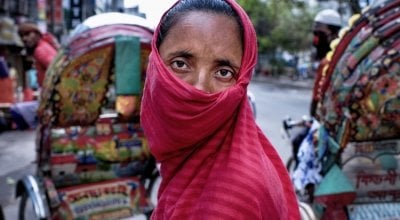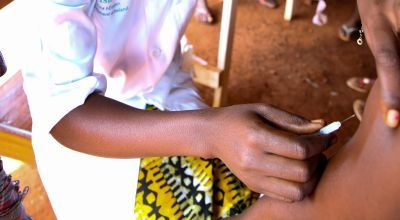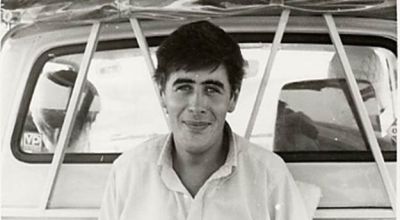
Read our 2024 annual report

Knowledge Hub
COVID-19 has arrived in Sudan at a time when the country is already dealing with a year of civil unrest and political change. West Darfur is a focal point of unrest and displacement within the country. Here we take a look at how the global pandemic is contributing to what is already a complex crisis in the region.
In July of 2019, Sudan began the process of transitioning back to democracy for the first time in 30 years. Triggered by several months of protests and civil unrest, the change in government sparked hope of economic transformation and a brighter future.
The region of Darfur has infamously been plagued by conflict since 2003 when a rebellion against the state government resulted in protracted fighting between rival groups. But recently, hope had been growing for a more peaceful future. The huge numbers of people displaced by the tribal conflict had been steadily decreasing for years, from 430,000 in 2014 to 13,000 in 2019. That was until 29 December 2019, when a dispute between Massalit and Arab tribesmen erupted in West Darfur.
The dispute began in a camp for Internally Displaced People (IDP) in Krinding (about 3 kilometres east of the state capital El Geneina) and went on to fuel a series of incidents in which at least 54 people were killed and 60 injured. El Geneina Hospital was also attacked by armed groups who destroyed the blood bank and looted equipment. The violence resulted in widespread internal displacement. Sudan's Humanitarian Aid Commission (HAC) has estimated that approximately 45,000 people were forced to flee, including 32,000 from three different IDP camps. Some 5,000 people crossed the border into Chad. Most took refuge in El Geneina, hiding wherever they could, including in schools and local government buildings.
A new challenge
Concern’s team in West Darfur began responding to the needs of the displaced in El Geneina, providing shelter kits for families to rebuild their homes, and constructing washing and toilet facilities after large areas of the camps had been set ablaze. They were busy responding to this crisis when news of a new disease reached their ears. Area Coordinator Kenneth Oyik, though, has vast experience with complex emergencies in several African countries with a number of international INGOs, admits that COVID-19 brings a new layer of complexity, one which has not been experienced before.
"At first, few people took notice, thinking that the disease would stay out of Sudan or maybe just be confined to the capital city Khartoum, but recently cases have reached West Darfur."
Sadly, there have already been several deaths, including healthcare workers.
Healthcare staff have been among those most affected, with a doctor and nurse from the local hospital among the dead.”
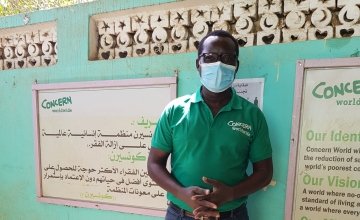
Despite this, Kenneth reports that communities themselves are struggling to take the threat of COVID-19 seriously. People in the area are simply confronted with so many challenges that COVID-19 is not regarded as the biggest risk to their lives.
“Few people have stopped shaking hands or started wearing face masks.”
Complicating matters, West Darfur borders with Chad and many communities straddle the two countries.
“Officially the border is closed to limit the spread of COVID-19, but there are hundreds of crossing points. Many families pass daily into the neighbouring country to fetch water or do shopping.”
With rumours abounding of cases of COVID-19 in the IDP camps in Chad, the porous border makes the difficult task of controlling the spread of the virus even more challenging.
Concern staff find themselves caught between two worlds. When in the office and while doing fieldwork, they must wear masks and are observing strict handwashing and social distancing requirements as they go about their work to mitigate against COVID-19. However, at home and in their neighbourhood, it is as if nothing has changed and it is difficult for them to maintain distance from others in the community.
Concern's response
With support from Irish Aid, our team is working to tackle this through an awareness-raising project which includes the distribution of information leaflets and posters on COVID-19. Community volunteers who usually help to screen for malnutrition have become COVID-19 awareness champions – taking information on how to protect against the virus to their villages using megaphones and drama. And instead of conducting mass screenings for malnutrition, our volunteers now immediately refer any suspected cases of malnutrition to the local health facility. This is just one of many adaptations Kenneth and the rest of the team have made to ensure the vital nutrition programming they have been doing can continue. Other adaptations include increasing the supply of the therapeutic food used to treat malnutrition to monthly, instead of weekly stocks, thereby reducing the need for people to attend the facility.
According to the 2020 Humanitarian Needs Overview for Sudan, West Darfur is classified as suffering from crisis levels of food insecurity, with 21% of people not having access to enough food, so it is vital that our nutrition work can continue to tackle the high rates of malnutrition in the area. This nutrition work is targeted not just at people living in the town of El Geneina but also for the residents of the many IDP camps located on the outskirts, as is the case with all of Concern’s programming in the region. Program Director for Concern Sudan, Eva Sztacho, explains.
About one quarter of El Geneina live in camps. But the way we work is that we work with everyone. Both the host population and the displaced populations. We try not to differentiate between them and to build our community as a whole.
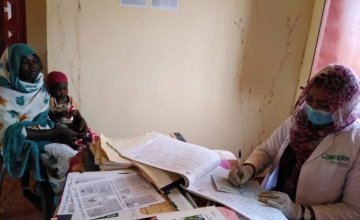
Another important aspect of the team’s work in West Darfur is helping to strengthen health systems in the region. This project, funded by the European Union, involves a number of pillars of support which include improving staff capacity, structural improvements to health facilities, and improving access to medicines. There is also a pillar that helps to monitor disease levels and epidemics in the region, for example, outbreaks of cholera or rising levels of malaria. And now it has been adapted to include a response to COVID-19, both in terms of helping to maintain safe and sterile environments for normal health services to continue, and in terms of increasing capacity to treat cases of the new virus. For example, we’re providing extra handwashing stations to all the health facilities and we’re ensuring that any training sessions that take place with health staff or community members observe strict social distancing protocols. And we have assisted in the setup of two COVID-19 isolation centres by supplying 20 beds, disinfectant and extra PPE.
As has been the case here in Ireland and beyond, PPE is a huge worry. Supplies are insufficient and already some health staff fear contracting the virus. However, the challenges for Sudan in containing this crisis go beyond anything we have experienced here. Their health system simply does not have the capacity to adequately test, trace, and treat those who contract the disease. As of June 22, confirmed cases in the country are at 8,698 and confirmed deaths have reached over 500. However, even with improved testing capacity, these figures are likely to be much higher in reality.
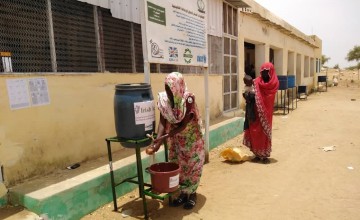
Unpredictable and complex crises
Yet COVID-19 remains just one of many life-threatening concerns. Thankfully, for those who had been displaced by the sudden violence in December, our team was able to support them to re-settle back into the IDP camps before the virus took hold. The cramped conditions they had been living under in the town would have offered little means of protection from infection.
Their experience epitomises the unpredictability and complexity of life in Sudan. The crises that existed before this virus arrived are not going away. The massive hope that welcomed the new government last year is already starting to fade as they struggle to bring about the economic transformation that people wished for. The rising price of food is sparking fresh fears as inflation rates have spiked three times since the change of leadership. If anything, the vast numbers of people in need of humanitarian assistance are only likely to increase as the economic impact of this pandemic is felt across the globe.
Making all the necessary adaptations, our teams in West Darfur and across Sudan are continuing with their life-saving work. You can support them by donating to our COVID-19 appeal today.



